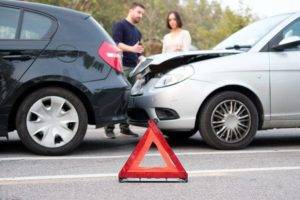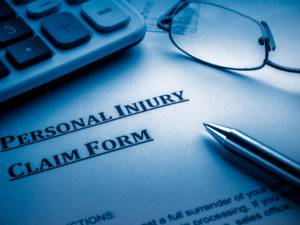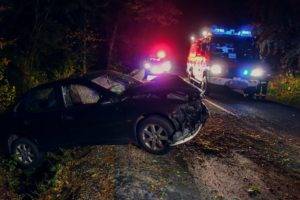If you don’t have personal injury insurance in Florida and suffer injuries in a car accident, you’ll have to pay for your medical bills and other damages out of your own pocket.
Personal injury protection (PIP) and bodily injury coverage can cover those costs so you don’t pay.
Understanding Personal Injury Insurance in Florida
Personal injury insurance in Florida refers to the required coverage in your auto insurance policy. Personal injury protection (PIP) coverage is meant to cover the costs of your medical expenses, lost wages and services if you become injured in a car accident.
Consequences for Not Having Personal Injury Insurance in Florida
If you don’t have personal injury insurance in Florida, you can be held liable for another person’s medical expenses if you are at fault for a car accident. However, Florida doesn’t consider not carrying this insurance illegal, so you won’t be punished criminally for it.
Need free legal help in Florida?
We specialize in personal injury claims.

What to Do if Involved a Car Accident Without Insurance in Florida When You’re Not at Fault
Car accidents are always devastating situations, especially if you sustain an injury. If you are involved in one in Florida, lack insurance and are not at fault, it can be challenging to know what to do. The best action you can take is to consult with a personal injury attorney who has experience in handling car accident cases so they can determine the right option for your situation. Depending on the circumstances, even if you lack insurance, your attorney may still be able to secure compensation for you if the case is successful.
Understanding Fault in a Car Accident
The theory of fault applies in a car accident in states that have fault laws. Florida is a no-fault state for car accidents, requiring drivers to go through the responsible driver’s auto insurance policy to pay for the costs of their medical expenses, lost wages and property damage. However, if a person sustains serious injuries and has medical expenses that exceed the amount the insurance policy covers, they can choose to file a personal injury lawsuit directly against the driver at fault for the accident.
What Happens if You Were at Fault?
If you are at fault for a car accident in Florida that results in personal injury, the other driver would be entitled to compensation for their medical expenses and other damages through your auto insurance coverage. However, if your insurance policy is not sufficient enough to cover the costs of the person’s damages, they can file a lawsuit against you directly.
What Happens if the Other Party Was at Fault?
After a car accident leaves you injured and the other driver was the one at fault, you have the right to file a claim for compensation through their auto insurance policy. However, if the person’s coverage is not enough to cover the cost of your medical expenses and other damages, you can then file a personal injury lawsuit directly against them.
Understanding What Happens if There Were Injuries
If someone suffers a personal injury after a car accident, they can file a claim through their auto insurance policy. PIP covers injuries regardless of who’s at fault.
Understanding What Happens if There Were No Injuries
After a car accident that renders damage to a person’s vehicle but doesn’t result in injuries, the situation is slightly different. In that scenario, instead of recovering compensation for medical expenses and lost wages through the at-fault driver’s auto insurance coverage, you can file a claim with the insurer to cover the costs of repairs to your vehicle.
What to Expect if You Lack Insurance But the Other Driver Was at Fault
Getting into a car accident when you don’t have auto insurance is a terrifying situation; it’s fair to question whether you can get compensation for your medical expenses and other damages even if the other driver was at fault. Fortunately, by law, if someone else is responsible for an accident and you don’t have insurance, you are still entitled to hold them liable. At the same time, even as you hold the at-fault driver accountable, you might still face penalties due to not having insurance coverage.
Understanding Whether You Can Get Insurance Coverage After a Car Accident
Of course, auto insurance is meant to cover you in the event of a car accident. If you don’t have insurance and then get into an accident, you will probably want to obtain coverage. While you can take out an auto insurance policy after a collision, it won’t cover you for that situation. Instead, auto insurance only covers future accidents.
When the Car You’re Driving is Insured
It’s always wise to have auto insurance to cover potential damages if you’re involved in a car accident. You never know when an accident might occur or when it can be your fault or the fault of another driver. In the latter situation and the car you’re driving is insured, you have the right to file a claim with the at-fault driver’s insurance policy. If you are driving someone else’s car and the vehicle is insured, you can still recover compensation through the other driver’s insurance.
Understanding What Happens if Neither Driver in an Accident Has Insurance
In some cases, two drivers might get into a car accident where both of them lack auto insurance coverage. Although this is rare, it’s important to speak with an attorney about your legal options. Florida requires drivers to have auto insurance with at least minimum personal injury protection (PIP) coverage and property damage liability (PDL) coverage amounting to $10,000. This is in place to protect drivers in the event of an accident that results in personal injury and property damage, respectively. In a situation where neither driver has insurance, one person can file a lawsuit against the one who was at fault to seek compensation to pay for their medical expenses and other damages. Unfortunately, it’s common for this to be a fruitless endeavor because many drivers without insurance can’t afford to pay; they might not have the financial means to pay the plaintiff if the lawsuit is successful.
Need free legal help in Florida?
We specialize in personal injury claims.

Consequences for Uninsured Drivers with the Florida DMV After a Car Accident
Again, Florida requires all drivers to have auto insurance and at least $10,000 in PIP and PDL coverage as part of their policy. However, some drivers choose to forgo having insurance at all. If this is the case and the person gets into a car accident, there are certain consequences they can face with the Florida Department of Motor Vehicles (DMV). Drivers who lack the required insurance can face fines and up to a three-year suspension of their driver’s license, license plates and registration.
Understanding the Insurance Requirements in Florida
In Florida, having auto insurance is a requirement for all drivers. All drivers are also required to carry at least $10,000 in PIP and at least $10,000 in PDL coverage. Drivers must have continuous insurance coverage even if they don’t drive their vehicle or it becomes impossible to operate it.
What to Know About Uninsured Drivers in Florida
Unfortunately, there are many uninsured drivers in Florida. According to the Insurance Information Institute, the state ranks as one of the top states for uninsured drivers with a rate of over 20%. If a driver is found to lack auto insurance coverage, they can face severe penalties, including a suspension of their license and hefty reinstatement fees. Additionally, if a driver has an accident, they can receive points against their driver’s license and possibly even jail time depending on the circumstances.
What Are the Penalties for Driving Without Auto Insurance in Florida?
There are certain penalties that can be imposed on individuals who drive without auto insurance in Florida. A person’s driver’s license can be suspended for as long as three years. This is often a problem when having a vehicle to get to and from work and other important places is a necessity. Registration may also be suspended. Reinstatement fees of up to $500 may also be imposed to reacquire one’s license.
What Are the Financial Consequences of Uninsured Driving?
There are financial consequences that come with driving uninsured. Your driver’s license can be suspended for up to three years, which means you may not have a way to go places and have to rely on alternative means of transportation. If this includes your job and you can’t find a ride there, it can have dire financial consequences such as getting terminated. You can be charged fines and a fee of up to $500 to have your license reinstated.
How Are Medical Bills and Other Expenses Handled After a Car Accident in Florida?
Usually, when a person suffers injuries in a car accident in Florida, they are compensated for their medical bills and other expenses through the at-fault driver’s auto insurance coverage. However, they can also go through their own PIP policy for compensation or file a lawsuit against the driver responsible for the accident if their injuries are severe, disabling or permanent. A person can also rely on their own auto insurance to cover the costs of their medical expenses and other damages if they are at fault for an accident.
Understanding Who’s Responsible for Paying if You Are Uninsured
If you don’t have auto insurance and are involved in a car accident and suffer injuries, you may be daunted about what happens and who’s responsible for paying. If the accident was not your fault but the fault of the other driver, you would have to file a lawsuit against them to recover compensation. However, if you were at fault, your medical bills and other damages would be your responsibility.
Covering Your Medical Expenses if You Lack Insurance Coverage
If you don’t have insurance, the best-case scenario for covering your medical expenses is to file a personal injury lawsuit directly against the other driver who was responsible for the accident.
What Are the No-Fault Requirements in Florida?
As a no-fault state, Florida requires all drivers to have auto insurance to protect themselves and others in the event of a car accident. All drivers must have at least $10,000 in PIP and at least $10,000 in PDL coverage. PIP can cover up to 80% of medical expenses considered reasonable if a person sustains a personal injury regardless of who’s at fault. PDL covers the costs of damage to a vehicle.
Understanding the Theory of No-Fault States
Florida is one of 12 states that follows the no-fault theory for car accidents. According to the law, when an accident occurs, regardless of who’s at fault, the drivers involved must go through their own auto insurance policy to cover the costs of their medical expenses, property damage and other damages. Filing a claim through one’s own insurer is the first step to getting compensation for the accident. However, depending on the circumstances and severity of the person’s injuries, another option is to file a lawsuit against the at-fault driver.
How Florida Handles Car Accident Claims
Because of Florida’s no-fault laws for car accidents, if a person needs to file a claim, it’s done with their auto insurance policy. This applies regardless of who’s at fault.
What Is the Role of Personal Injury Protection (PIP) Coverage in a No-Fault State?
When an accident results in injuries, PIP coverage covers the individual’s medical expenses. Through no-fault laws, PIP is meant to protect all drivers in the event that they suffer injuries in a collision. Florida requires all drivers to carry at least the minimum in PIP coverage, which amounts of $10,000.
What Are the Benefits and Limitations of PIP Coverage in Florida?
The benefits of PIP coverage in Florida is that it can pay for an injured driver’s medical expenses and lost wages and cover accident victims who die in the form of death benefits to their survivors. However, PIP only pays up to 80% of medical expenses, 60% toward lost wages and services and only $5,000 in death benefits.
Understanding Death Benefits Through Florida PIP
In Florida, PIP offers death benefits to the surviving family members of individuals who die as a result of injuries sustained in a car accident. The insurance coverage amounts to $5,000 and doesn’t count toward PIP’s $10,000 limit.
What Legal Options Do Uninsured Drivers Have?
Drivers who don’t have insurance and get into accidents can consult with an attorney to discuss their legal options. If a driver suffers injuries and another person was at fault for the car accident, they can file a personal injury lawsuit against them. A lawyer can provide valuable advice on the best way to proceed.
Uninsured Drivers and Suing After an Accident
If an uninsured driver suffers serious injuries after a car accident and is not at fault, they can file a lawsuit against the other driver. However, in that situation, it’s always wise to first speak with an attorney.
Frequently Asked Questions
What Happens if You Don’t Have PIP in Florida?
In Florida, if you drive and don’t have PIP coverage, it means you’re violating the state’s requirements and can face a variety of consequences if you’re caught.
Does Florida Require Personal Injury Insurance?
PIP coverage is equivalent to personal injury insurance in Florida. All drivers are required to carry at least $10,000 in PIP coverage.
What Is the Penalty for Having an Accident Without Insurance in Florida?
If you get into an accident in Florida and don’t have auto insurance, you can face certain penalties. Your driver’s license can be revoked for up to three years.
Is it Illegal to Not Have Insurance in Florida?
Florida requires all drivers to have auto insurance, so if you aren’t covered, it’s considered illegal.
What Is the Average Cost of PIP in Florida?
The average cost of PIP in Florida is around the $1,900 range.
Can Your License Be Suspended for Not Having Insurance in Florida?
If you don’t have auto insurance in Florida, you run the risk of a license suspension lasting up to three years.
What Is the New PIP Law in Florida in 2023?
In March 2023, a new PIP law was introduced in Florida to eliminate the no-fault system for car accidents and auto insurance requirements.
What Is the Statute of Limitations for PIP in Florida?
In Florida, the statute of limitations for PIP is two years from the date the injured party realized they, indeed, suffered an injury from a car accident.
What Is the 14-Day Rule for PIP in Florida?
Florida’s 14-day PIP rule means that you have 14 days from the date of a car accident to seek medical attention for your injuries. Failing to do this can result in being denied PIP benefits.
Who Gets the PIP Check in Florida?
If you or any of your family members in your household suffer car accident injuries in an accident caused by another driver, you can get a PIP check in Florida in a successful claim.
Can You Go to Jail for a Car Accident in Florida?
A person can go to jail for a car accident in Florida if they commit certain traffic violations such as reckless driving or driving under the influence (DUI). However, they can go to prison if they are convicted of offenses like vehicular homicide. You cannot go to jail just for having a regular accident or not having insurance.
Is Florida a No-Fault State for Accidents?
Florida is a no-fault state when it comes to car accidents.
What Is the Statute for No Proof of Insurance in Florida?
Florida Statute 316.646(3) is also known as Proof of Insurance Required. It states that if a driver fails to show proof of insurance after a traffic citation, they can automatically be convicted and their license will be suspended.
What Insurance Is Legally Required in Florida?
All Florida drivers must have auto insurance with at least $10,000 in PIP and PDL coverage.
Is Florida a Mandatory Insurance State?
Florida is a mandatory insurance state that requires all drivers to carry at least minimum coverage.
Who Pays for Car Damage in Florida No-Fault?
In Florida, each driver pays for their own car damage due to the no-fault laws. However, if a person files a lawsuit against the at-fault driver, that person pays if the claim is successful.
What Happens if Someone Hits You and You Don’t Have Insurance in Florida?
If someone hits your vehicle in Florida and you don’t have insurance, you might have to consult with a personal injury attorney to discuss your options and file a lawsuit against that person.
What Happens if the Person at Fault in an Accident Has No Insurance in Florida?
In Florida, if you’re in an accident and the person at fault lacks insurance, you can still file a claim with your own insurance policy. However, if your injuries are severe and your medical expenses and other damages significant, you can file a personal injury lawsuit against the at-fault driver. It should be noted that this route doesn’t always work because often, drivers without insurance don’t have enough money to pay.
What Happens if Someone Else is Driving My Car and Gets in an Accident in Florida?
Auto insurance follows the vehicle first. Thus, if someone else is driving your car and gets into an accident in Florida, they are covered for injuries and other damages as long as you have insurance.
Florida PIP Insurance Rules
Florida’s PIP insurance rules state that all drivers must carry at least $10,000 in coverage in the event they are in an accident that results in injuries.
What Are the Penalties if You Are at Fault in a Crash and You Are Not Insured?
If you get into a car accident and are not insured, penalties include suspension of your driver’s license for up to three years. Your license plate may also be suspended for the same time period; you cannot get a temporary license during the suspension.
What Happens if You Get Insurance After an Accident?
If you get auto insurance after a car accident, it only applies to any collisions going forward. It will not cover your damages for accidents prior to obtaining it.
What Is the Maximum PIP Coverage in Florida?
The maximum PIP coverage in Florida is 80% of your policy. You have up to $10,000 in coverage per person for injuries.
Need free legal help in Florida?
We specialize in personal injury claims.






